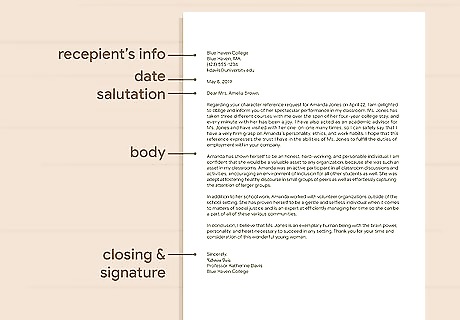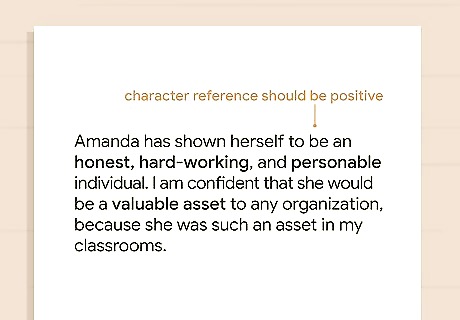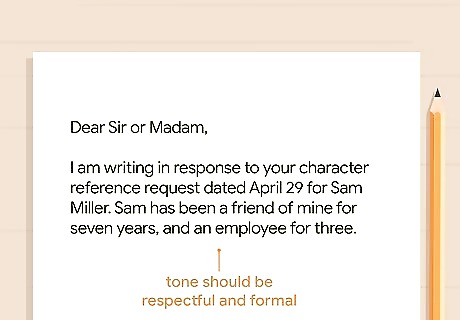
views
- Clarify why the person needs a character reference and who will be reading it. This will influence the specific traits or stories you write about.
- Use a 3-part format to describe your relationship with the person, highlight their positive traits, and ask the recipient to consider them favorably.
- Write with a positive tone that’s respectful and professional.
Writing the Letter

Include background on yourself and your relationship to the person you’re writing for. Introduce basic information up front. Who are you and what is your relationship to the person you are writing for? How long have you known the person in question? How much time do you spend together? Where did you meet? Readers of a character reference letter want to know exactly what kind of relationship the writer has to the individual for whom they’re vouching. Spend time thinking about the nature of your relationship to the individual in question. Be detailed. Instead of saying, “I’ve known Tom for three years,” say instead, “I have had the pleasure of working alongside Tom for the past three years at Yum Yum Burgers in Paytonville, Ohio.”

Use an appropriate format when writing the character reference. Character references should follow a three-part format consisting of an opening introductory paragraph in which you describe who you are and your relationship to the person on whose behalf you’re writing; a second paragraph in which you lay out your analysis of the person’s character; and a closing paragraph in which you beseech the reader to look favorably upon the individual who you’re writing about. Close the reference letter by urging the reader to look favorably upon the subject of the letter. Sign it “Sincerely, [your name].” Keep the character reference letter short. The readers don't need page after page of information on a character reference. They need the basics. Keep this in mind when penning a rough draft for your character reference.

Keep the character reference letter positive. A character reference letter is not a venue for carefully comparing the good and bad parts of a person's personality, background or lifestyle. It should, instead, be aimed at providing an honest but upbeat assessment of the individual’s accomplishments, goals, and personality. A successful character reference will leave the reader with a positive impression of the individual in question. Use positive adjectives in order to stress what a good person your subject is. List, briefly, the relevant accomplishments for the person about whom the reference is being written. For instance, if the individual has donated to philanthropic causes with either time or money, mention as much in your letter. If they have a military background and served with honor, cite their acts of bravery or courage in order to minimize a harsh legal penalty. List also any contributions the individual makes to their church or fraternal organization. If you find yourself wondering whether or not to put a certain accomplishment in, ask yourself, "Is this relevant or does it show good traits?"

Do a final edit. Before submitting your letter, give it a once-over to catch any spelling, punctuation or grammar mistakes. New word processing technology makes this task easier for those who are not great writers. Check any words which are underlined with a red squiggly line; unless they are names, they are likely misspelled. In addition to spelling and grammar, ensure your facts are correct. Submit a draft copy to the person on whose behalf you’re writing in order to ensure everything is correct.
Planning the Character Reference Letter

Adopt an appropriate tone. Character references should always be respectful and formal in tone. Speak honestly, but do not disparage the ability of the reader to render an effective verdict. Your reader will probably be a judge, professor, or other person of esteem. Address judges and magistrates as “Your Honor,” professors as “Doctor” or “Professor,” and commanding officers in the military by their rank (for instance, “General” or “Sergeant”).

Find out why the person you’re writing for needs the letter. Reference letters are often needed for job applications and in court cases to establish that an individual’s illegal behavior is outside the norm for them. Other cases in which a character reference might be called for include potential landlords, students applying to college, and immigrants applying for citizenship. If you’re writing for a court case, ensure you know the exact details of the crime the person you’re writing for committed, and talk to them about their feelings about the case. Show the person you’re writing to that you understand the gravity of the case, and if the accused seems to genuinely regret what they did, stress this in your letter. Do not write a letter for someone you don’t know well, or who hesitates to give you all the requisite background details as to why they need a character reference from you.

Identify who will be reading the letter. Know the name and position of the person you’re writing to. For instance, if you are writing a character reference on behalf of a friend applying to an academic posting, ensure you know what school they’ve applied to, what the position is, and who is going to be reading the letter. That way you can personalize it and demonstrate that you -- and, by extension, your friend -- have put serious energy into the character reference. If you’re writing to a group of people like an academic review board or an anonymous board of immigration and naturalization officials, address the letter with “Dear Sir or Madam.”




















Comments
0 comment